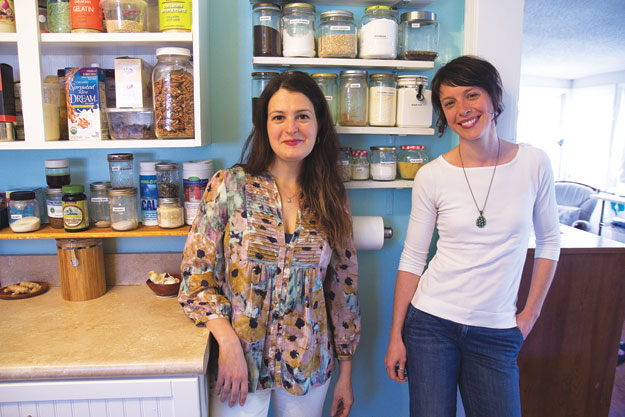You Are What You Eat
Advice for jump-starting healthy food goals

There’s no better time than spring to start building healthy eating habits.
Farmers markets are open, and fresh produce will be available in abundance for the next several months. But many find themselves struggling to get on the right track. WILMA spoke with three Wilmington women working to help their clients get a handle on healthy eating by getting the right information, cutting hidden calories, and letting go of processed food.
“Wading through the overwhelming amount of nutritional information that’s out there can be really daunting,” says GRUB co-owner LIZ FLINT-SOMERVILLE, who along with RYANNA BATTISTE, offers coaching, workshops, classes, and now pantry clean outs for her clients.

Flint-Somerville says it’s important is to find a realistic starting point. For many, that means reducing or eliminating sodas and drinking more water. Cutting out high calorie choices like fried foods is easy, but it is the “hidden calories” that add up, she says.
 HEIDI KAUFMAN (left), a clinical nutritionist with Wilmington Health, says sugary drinks and cooking oils are high in calories, but people often overlook them. Increasing consumption of whole foods and cutting hidden calories will improve your diet and also help with weight loss, according to Kaufman.
HEIDI KAUFMAN (left), a clinical nutritionist with Wilmington Health, says sugary drinks and cooking oils are high in calories, but people often overlook them. Increasing consumption of whole foods and cutting hidden calories will improve your diet and also help with weight loss, according to Kaufman.
“I always say if it goes bad, it’s good for you,” says EVONNE WHITE, owner of CLEAN EATZ, a local café dedicated to low calorie, low fat meals. “If it sits on a shelf, it’s not. You want to choose perishables over preservatives.”
White advises going back to basics when it comes to meal planning. Start by eating lean proteins such as chicken, fish, and lean beef. Steam veggies and use fresh herbs as seasoning for proteins and produce rather than store-bought marinades, dressings, and seasoning blends that are packed with sodium, chemical stabilizers, and preservatives.
Preserving chemicals are found in almost all processed foods, and many may be wreaking havoc with our bodies without our even knowing it. Sodium benzoate for example
is associated with hyperactivity in children, says Flint-Somerville, and yet it’s likely found in many cereals and snacks.
Kaufman, whose patients often are battling chronic diseases related to diet, says that increasing consumption of fresh, whole foods helps the body on multiple levels. Fresh produce is filled with fiber, which makes you feel full longer. The phytonutrients found in produce can have a valuable impact on the body’s ability to heal, she points out.
But a popular misconception is that sugar found in fruit is not going to adversely affect either your blood sugar or your weight.
Not necessarily so, says Kaufman.
Fruit sugar can have similar effects as processed sugar, she warns, adding that the popular trend of juicing is fine if juices are used as occasional meal replacements, but adding a lot of fruit or fruit juice to your regular diet can add extra calories and impact blood sugar levels.
“Fruit of course is a much better choice than processed snacks because of the fiber and nutrients it contains,” Kaufman says. “But if one istrying to lose weight it’s something to be aware of.”
But meal planning, shopping, and cooking all take time − something many people find themselves running short on.
 White’s Clean Eatz has recently taken its meals on the road, offering Clean Eatz Express, a mobile food truck that travels statewide selling the eatery’s packaged meals.
White’s Clean Eatz has recently taken its meals on the road, offering Clean Eatz Express, a mobile food truck that travels statewide selling the eatery’s packaged meals.
“Everything in our society has become supersized,” White says. “The whole reason our café and packaged meal plans came about was to help people have access to healthy, portion-controlled meals.”
In addition to pantry clean outs, GRUB now offers assistance with grocery shopping and cooking classes to further help clients get on the right track.
“Cleaning out a pantry is a great first step,” Flint-Somerville says. “But knowing where to find healthier choices and how to prepare them is key to creating habits for a new lifestyle.”
Change isn’t easy, and having a support system is key to making a permanent change in diet. For some that might be the help of a food coach, a dietician, or a plan such as Weight Watchers.
“At GRUB we have two rules,” Flint-Somerville says. “Eat real foods and listen to your body. Everybody is coming from a different place, and our bodies are beautifully unique.”
To view more of photographer Terah Wilson’s work, go to timelessfotographie.com